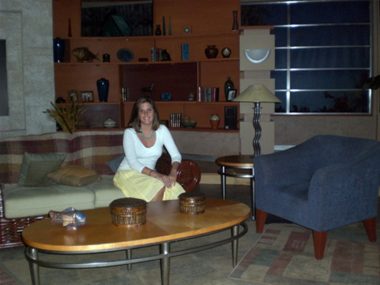Some days she’ll go hours without speaking English. If she’s taking the subway, she’s most likely speaking Spanish. When she gets to work, she’s definitely speaking Spanish.

“I just wanted to immerse myself in Hispanic culture,” Jacobs says. “Living down here, you really are in the midst of a lot of Hispanic culture and language. It’s just a great environment to pursue an internship like this in.”
But don’t think about speaking English to her.
“A lot of the cameramen remind everyone that they have to speak to me in Spanish, so it’s nice to have that,” she says. “I never thought I looked as much like a white girl as I do, but everyone can tell I’m not Hispanic just by looking at me. Sometimes I have to remind them to speak to me in Spanish so I can improve on my Spanish skills.”
Her bilingual acumen was born in Peru while her mother worked for the American embassy. She lived there for a short time but eventually moved back to the United States, where she grew up with a Hispanic nanny. As a result, she’s been speaking Spanish her entire life.
Now, Jacobs is working on one of Univision’s network shows—“El Show de Cristina”—where she collaborates with producers to develop show ideas and to invite guests to serve as panelists. Cristina, Jacobs says, is “like the Hispanic Oprah.” The show tapes two episodes twice a month, and it airs weekly on Mondays at 10 p.m.
“At the show, everyone’s like a family,” she says. “Everyone is willing to give me something to do. They put trust in me. They’re open-minded to working with an American right away.”
Jacobs says her immediate goals for her internship are for her show ideas to be picked up and used for an actual episode and to improve her Spanish. Looking long term, she says her Univision experience will help her decide if she wants to chase a career in the field of international broadcast communications.
“I felt lucky because I didn’t expect to find an internship that would incorporate both until post graduation, and now that I’m having this, it’s opening up my eyes to the world of Hispanic TV and making me think about whether or not it’s something I may want to pursue later in life.”
To secure the internship, Jacobs says she sent in a resume and cover letter and completed a phone interview (all in Spanish) that she described as “nerve wracking” because, even though she’s proficient in the language, she said she couldn’t gauge reactions over the phone.
She says she was accepted as an intern shortly after the phone interview. And, she says, so far her work has been well received, in part, because of how she’s been prepared in the School of Communications.
Next summer, Jacobs says she might pursue a hard-news internship. But for now, she’s getting two times more out of an internship than most students—professional experience and increased Spanish aptitude.
“I think this internship will definitely give me a taste of whether or not I want to pursue a job in an international market,” Jacobs says. “So it will give me insight into that.”


